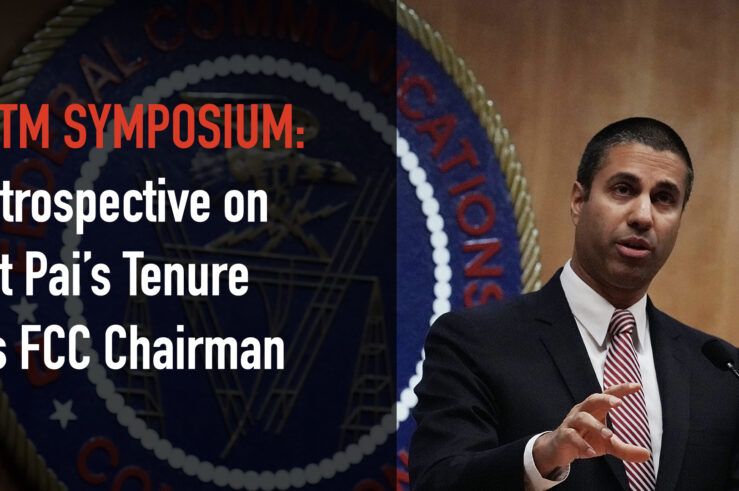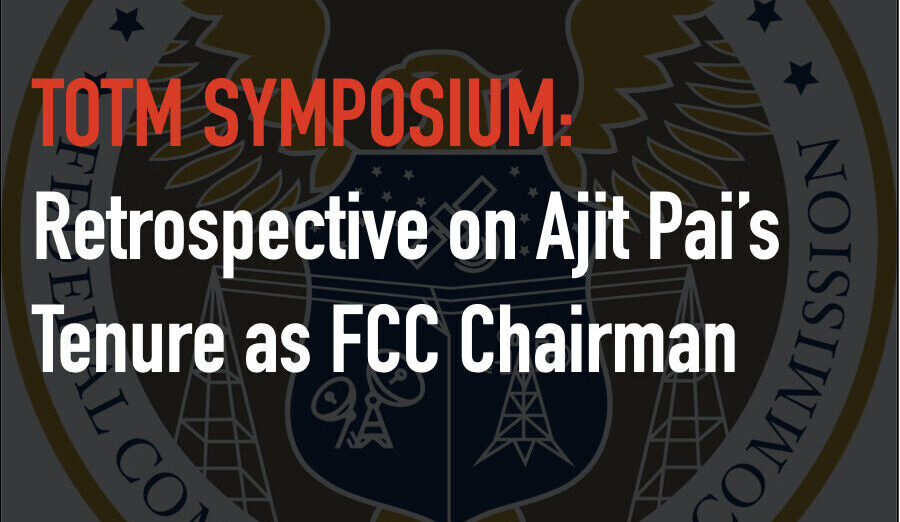
This article is a part of the Retrospective on Ajit Pai's Tenure as FCC Chairman symposium.

During Chairman Ajit Pai’s tenure, the Federal Communications Commission adopted key reforms that improved the agency’s processes. No less important than process reform is process integrity. The commission’s L-Band Order and the process that produced it will be the focus here. In that proceeding, Chairman Pai led a careful and deliberative process that resulted in a clearly reasoned and substantively supportable decision to put unused valuable L-Band spectrum into commercial use for wireless services.
Thanks to one of Chairman Pai’s most successful process reforms, the FCC now publicly posts draft items to be voted on three weeks in advance of the commission’s public meetings. During his chairmanship, the commission adopted reforms to help expedite the regulatory-adjudication process by specifying deadlines and facilitating written administrative law judge (ALJ) decisions rather than in-person hearings. The “Team Telecom” process also was reformed to promote faster agency determinations on matters involving foreign ownership.
Along with his process-reform achievements, Chairman Pai deserves credit for ensuring that the FCC’s proceedings were conducted in a lawful and sound manner. For example, the commission’s courtroom track record was notably better during Chairman Pai’s tenure than during the tenures of his immediate predecessors. Moreover, Chairman Pai deserves high marks for the agency process that preceded the L-Band Order – a process that was perhaps subject to more scrutiny than the process of any other proceeding during his chairmanship. The public record supports the integrity of that process, as well as the order’s merits.
In April 2020, the FCC unanimously approved an order authorizing Ligado Networks to deploy a next-generation mixed mobile-satellite network using licensed spectrum in the L-Band. This action is critical to alleviating the shortage of commercial spectrum in the United States and to ensuring our nation’s economic competitiveness. Ligado’s proposed network will provide industrial Internet-of-Things (IoT) services, and its L-Band spectrum has been identified as capable of pairing with C-Band and other mid-band spectrum for delivering future 5G services. According to the L-Band Order, Ligado plans to invest up to $800 million in network capabilities, which could create over 8,000 jobs. Economist Coleman Bazelon estimated that Ligado’s network could help create up to 3 million jobs and contribute up to $500 billion to the U.S. economy.
Opponents of the L-Band Order have claimed that Ligado’s proposed network would create signal interference with GPS services in adjacent spectrum. Moreover, in attempts to delay or undo implementation of the L-Band Order, several opponents lodged harsh but baseless attacks against the FCC’s process. Some of those process criticisms were made at a May 2020 Senate Armed Services Committee hearing that failed to include any Ligado representatives or any FCC commissioners for their viewpoints. And in a May 2020 floor speech, Sen. James Inhofe (R-Okla.) repeatedly criticized the commission’s process as sudden, hurried, and taking place “in the darkness of a weekend.”
But those process criticisms fail in the face of easily verifiable facts. Under Chairman Pai’s leadership, the FCC acted within its conceded authority, consistent with its lawful procedures, and with careful—even lengthy—deliberation.
The FCC’s proceeding concerning Ligado’s license applications dates back to 2011. It included public notice and comment periods in 2016 and 2018. An August 2019 National Telecommunications and Information Administration (NTIA) report noted the commission’s forthcoming decision. In the fall of 2019, the commission shared a draft of its order with NTIA. Publicly stated opposition to Ligado’s proposed network by GPS operators and Defense Secretary Mark Esper, as well as publicly stated support for the network by Attorney General William Barr and Secretary of State Mike Pompeo, ensured that the proceeding received ongoing attention. Claims of “surprise” when the commission finalized its order in April 2020 are impossible to credit.
Importantly, the result of the deliberative agency process helmed by Chairman Pai was a substantively supportable decision. The FCC applied its experience in adjudicating competing technical claims to make commercial spectrum policy decisions. It was persuaded in part by signal testing conducted by the National Advanced Spectrum and Communications Test Network, as well as testing by technology consultants Roberson and Associates. By contrast, the commission found unpersuasive reports of alleged signal interference involving military devices operating outside of their assigned spectrum band.
The FCC also applied its expertise in addressing potential harmful signal interference to incumbent operations in adjacent spectrum bands by imposing several conditions on Ligado’s operations. For example, the L-Band Order requires Ligado to adhere to its agreements with major GPS equipment manufacturers for resolving signal interference concerns. Ligado must dedicate 23 megahertz of its own licensed spectrum as a guard-band from neighboring spectrum and also reduce its base station power levels 99% compared to what Ligado proposed in 2015. The commission requires Ligado to expeditiously replace or repair any U.S. government GPS devices that experience harmful interference from its network. And Ligado must maintain “stop buzzer” capability to halt its network within 15 minutes of any request by the commission.
From a process standpoint, the L-Band Order is a commendable example of Chairman Pai’s perseverance in leading the FCC to a much-needed decision on an economically momentous matter in the face of conflicting government agency and market provider viewpoints. Following a careful and deliberative process, the commission persevered to make a decision that is amply supported by the record and poised to benefit America’s economic welfare.



